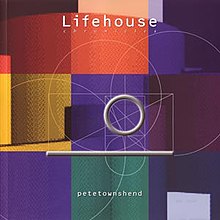
Peter Dennis Blandford Townshend is an English musician. He is the co-founder, guitarist, second lead vocalist and principal songwriter of the Who, one of the most influential rock bands of the 1960s and 1970s. His aggressive playing style and poetic songwriting techniques, with the Who and in other projects, have earned him critical acclaim.
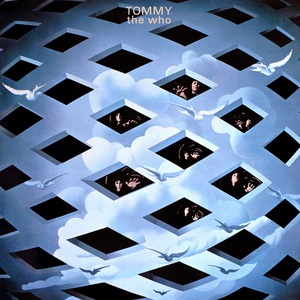
Tommy is the fourth studio album by the English rock band the Who, released on 19 May 1969. Written primarily by guitarist Pete Townshend, Tommy is a double album and an early rock opera that tells the story of the fictional Tommy Walker and his path to becoming a spiritual leader and messianic figure.

Quadrophenia is the sixth studio album by the English rock band the Who, released as a double album on 26 October 1973 by Track Records. It is the group's third rock opera, the previous two being the "mini-opera" song "A Quick One, While He's Away" (1966) and the album Tommy (1969). Set in London and Brighton in 1965, the story follows a young mod named Jimmy and his search for self-worth and importance. Quadrophenia is the only Who album entirely written by Pete Townshend.

Who's Next is the fifth studio album by the English rock band the Who, released on 2 August 1971, by Track Records in the United Kingdom and Decca Records in the United States. It developed from the aborted Lifehouse project, a multi-media rock opera conceived by the group's guitarist Pete Townshend as a follow-up to the band's 1969 album Tommy. The project was cancelled owing to its complexity and to conflicts with Kit Lambert, the band's manager, but the group salvaged some of the songs, without the connecting story elements, to release as their next album. Eight of the nine songs on Who's Next were from Lifehouse, with the lone exception being the John Entwistle-penned "My Wife". Ultimately, the remaining Lifehouse tracks would all be released on other albums throughout the next decade.

Psychoderelict is a seventh studio album by Pete Townshend. Some characters and issues presented in this work were continued in Townshend's later opus The Boy Who Heard Music, first presented on the Who's eleventh studio album Endless Wire (2006) and then adapted as a rock musical.
Lifehouse is an unfinished science fiction rock opera by the Who intended as a follow-up to Tommy. It was abandoned as a rock opera in favour of creating the traditional rock album Who's Next, though its songs would appear on various albums and singles by the Who, as well as Pete Townshend's solo albums. In 1978, aspects of the Lifehouse project were revisited by the Who on Who Are You. In 2000, Townshend revived the Lifehouse concept with his set Lifehouse Chronicles and the sampler Lifehouse Elements. On 1 May 2007, he released an online software called The Lifehouse Method in which any "sitter" could create a musical "portrait". The site is now defunct. The artwork and design of the box set was undertaken by designer Laurence Sutherland.

"Baba O'Riley" is a song by the English rock band The Who, written by guitarist and principal songwriter Pete Townshend. It is the opening track to the Who's fifth studio album, Who's Next (1971). In Europe, it was released as a single in October 1971, coupled with "My Wife". Performances of "Baba O'Riley" appear on several Who live albums.
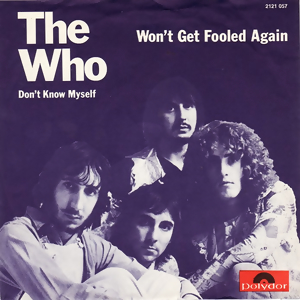
"Won't Get Fooled Again" is a song by the English rock band the Who, written by guitarist and primary songwriter Pete Townshend. It was released as a single in June 1971, reaching the top 10 in the UK, while the full eight-and-a-half-minute version appears as the final track on the band's 1971 album Who's Next, released that August. In the US, the single entered Billboard on 17 July, reaching No. 15.

Who Came First is the debut studio album by the English musician Pete Townshend, released in 1972 on Track Records in the UK and Track/Decca in the US.

The Ultimate Collection is a 2002 two-disc greatest hits set by the Who with both singles and top hits from albums, all of which have been remastered. The compilation was released by Polydor Records internationally and on MCA Records in the U.S. The first 150,000 copies added a third disk with rare tracks and music videos. The album debuted on the Billboard 200 album chart on 29 June 2002, at No. 31 and hit No. 17 on the British charts. It was certified gold by the RIAA on 15 July 2002 and platinum on 13 March 2008.
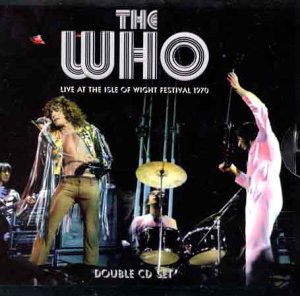
Live at the Isle of Wight Festival is a double live album by The Who, recorded at the Isle of Wight Festival on 29 August 1970, and released in 1996. A DVD of the concert was also released for the first time in 1996.
"My Wife" is a song by the English rock band the Who, written and sung by bass guitarist John Entwistle. It was originally released in 1971 on Who's Next and later as the B-side of the single "Baba O'Riley" on 6 November 1971 in Europe by Polydor Records.

"Slip Kid" is a song from the Who's seventh album, The Who by Numbers. Written originally for Pete Townshend's shelved Lifehouse rock opera, "Slip Kid" was revived in 1975. The song was originally written as a warning about the music business, though Townshend has pointed out the song's relevance in different contexts. The song was released as a single in the US, backed by "Dreaming from the Waist", but failed to chart.

Live from Toronto is a double live album by The Who recorded during the last concert of the It's Hard Tour at the Maple Leaf Gardens in Toronto, 17 December 1982. These performances were originally broadcast live on cable TV and FM radio across the U.S. and Canada. It was later released in the early 1980s on VHS video tape.

The Kids Are Alright is a 1979 rockumentary film about the English rock band the Who, including live performances, promotional films and interviews from 1964 to 1978. It notably features the band's last performance with long-term drummer Keith Moon, filmed at Shepperton Studios in May 1978, three months before his death.

Amazing Journey: The Story of The Who is a 2007 documentary film by Murray Lerner and Paul Crowder about English rock and roll band The Who. The film features new interviews with band members Roger Daltrey, John Entwistle, Kenney Jones, and Pete Townshend, as well as Sting, The Edge, Noel Gallagher, Eddie Vedder, Steve Jones and others, as well as rare photos of the four members of the band, and archival live footage of performances dating back to 1964. A soundtrack accompanying the film also serves as a greatest-hits compilation for the band.

"Join Together" is a song by British rock band the Who, first released as a non-album single in June 1972. The song has since been performed live multiple times and has appeared on numerous compilation albums. It was the last Who single to be released in the United States which used the Decca Records color bar label.

Pete Townshend Live: Sadler's Wells 2000 is a live album released by Pete Townshend in 2000. Townshend presented the music from Lifehouse at two concerts at Sadler's Wells Theatre in London on February 25 and 26, 2000, supported by a number of musicians and vocalists and The London Chamber Orchestra. Musicians included Townshend, Chucho Merchán, Phil Palmer, John "Rabbit" Bundrick, Peter Hope-Evans and Jody Linscott. Vocalists included Chyna, Cleveland Watkiss and Billy Nicholls. Violinist and orchestra leader Gaby Lester performed the violin solo on "Baba O'Riley". The live recording was also released as a video/DVD titled Pete Townshend – Music from Lifehouse in 2002.

Method Music is a double-album of electronic music by the English composer and mathematician Lawrence Ball created using the compositional system that would become The Lifehouse Method, an online-based compositional project conceived by Pete Townshend of The Who to compose customized algorithmically-generated musical portraits. The album's music evolved from tests of the portraiture system.
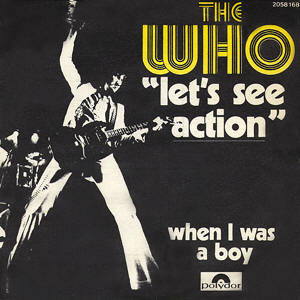
"Let's See Action" is a song written and composed by Pete Townshend and recorded by the Who. It was released as a single in the UK in 1971 and reached #16 in the charts.
